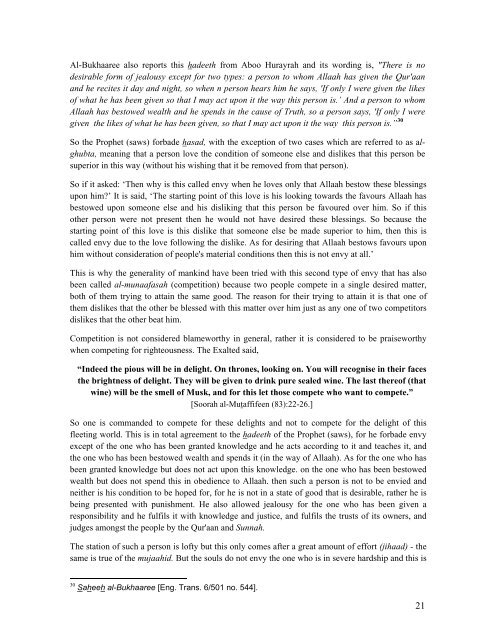You also want an ePaper? Increase the reach of your titles
YUMPU automatically turns print PDFs into web optimized ePapers that Google loves.
Al-Bukhaaree also reports this hadeeth from Aboo Hurayrah and its wording is, "There is no<br />
desirable form <strong>of</strong> jealousy except for two types: a person to whom Allaah has given <strong>the</strong> Qur'aan<br />
and he recites it day and night, so when n person hears him he says, 'If only I were given <strong>the</strong> likes<br />
<strong>of</strong> what he has been given so that I may act upon it <strong>the</strong> way this person is.’ And a person to whom<br />
Allaah has bestowed wealth and he spends in <strong>the</strong> cause <strong>of</strong> Truth, so a person says, 'If only I were<br />
given <strong>the</strong> likes <strong>of</strong> what he has been given, so that I may act upon it <strong>the</strong> way this person is.” 30<br />
So <strong>the</strong> Prophet (saws) forbade hasad, with <strong>the</strong> exception <strong>of</strong> two cases which are referred to as alghubta,<br />
meaning that a person love <strong>the</strong> condition <strong>of</strong> someone else and dislikes that this person be<br />
superior in this way (without his wishing that it be removed from that person).<br />
So if it asked: ‘Then why is this called envy when he loves only that Allaah bestow <strong>the</strong>se blessings<br />
upon him?’ It is said, ‘The starting point <strong>of</strong> this love is his looking towards <strong>the</strong> favours Allaah has<br />
bestowed upon someone else and his disliking that this person be favoured over him. So if this<br />
o<strong>the</strong>r person were not present <strong>the</strong>n he would not have desired <strong>the</strong>se blessings. So because <strong>the</strong><br />
starting point <strong>of</strong> this love is this dislike that someone else be made superior to him, <strong>the</strong>n this is<br />
called envy due to <strong>the</strong> love following <strong>the</strong> dislike. As for desiring that Allaah bestows favours upon<br />
him without consideration <strong>of</strong> people's material conditions <strong>the</strong>n this is not envy at all.’<br />
This is why <strong>the</strong> generality <strong>of</strong> mankind have been tried with this second type <strong>of</strong> envy that has also<br />
been called al-munaafasah (competition) because two people compete in a single desired matter,<br />
both <strong>of</strong> <strong>the</strong>m trying to attain <strong>the</strong> same good. The reason for <strong>the</strong>ir trying to attain it is that one <strong>of</strong><br />
<strong>the</strong>m dislikes that <strong>the</strong> o<strong>the</strong>r be blessed with this matter over him just as any one <strong>of</strong> two competitors<br />
dislikes that <strong>the</strong> o<strong>the</strong>r beat him.<br />
Competition is not considered blameworthy in general, ra<strong>the</strong>r it is considered to be praiseworthy<br />
when competing for righteousness. The Exalted said,<br />
“Indeed <strong>the</strong> pious will be in delight. On thrones, looking on. You will recognise in <strong>the</strong>ir faces<br />
<strong>the</strong> brightness <strong>of</strong> delight. They will be given to drink pure sealed wine. The last <strong>the</strong>re<strong>of</strong> (that<br />
wine) will be <strong>the</strong> smell <strong>of</strong> Musk, and for this let those compete who want to compete.”<br />
[Soorah al-Mutaffifeen (83):22-26.]<br />
So one is commanded to compete for <strong>the</strong>se delights and not to compete for <strong>the</strong> delight <strong>of</strong> this<br />
fleeting world. This is in total agreement to <strong>the</strong> hadeeth <strong>of</strong> <strong>the</strong> Prophet (saws), for he forbade envy<br />
except <strong>of</strong> <strong>the</strong> one who has been granted knowledge and he acts according to it and teaches it, and<br />
<strong>the</strong> one who has been bestowed wealth and spends it (in <strong>the</strong> way <strong>of</strong> Allaah). As for <strong>the</strong> one who has<br />
been granted knowledge but does not act upon this knowledge. on <strong>the</strong> one who has been bestowed<br />
wealth but does not spend this in obedience to Allaah. <strong>the</strong>n such a person is not to be envied and<br />
nei<strong>the</strong>r is his condition to be hoped for, for he is not in a state <strong>of</strong> good that is desirable, ra<strong>the</strong>r he is<br />
being presented with punishment. He also allowed jealousy for <strong>the</strong> one who has been given a<br />
responsibility and he fulfils it with knowledge and justice, and fulfils <strong>the</strong> trusts <strong>of</strong> its owners, and<br />
judges amongst <strong>the</strong> people by <strong>the</strong> Qur'aan and Sunnah.<br />
The station <strong>of</strong> such a person is l<strong>of</strong>ty but this only comes after a great amount <strong>of</strong> effort (jihaad) - <strong>the</strong><br />
same is true <strong>of</strong> <strong>the</strong> mujaahid. But <strong>the</strong> souls do not envy <strong>the</strong> one who is in severe hardship and this is<br />
30 Saheeh al-Bukhaaree [Eng. Trans. 6/501 no. 544].<br />
21


